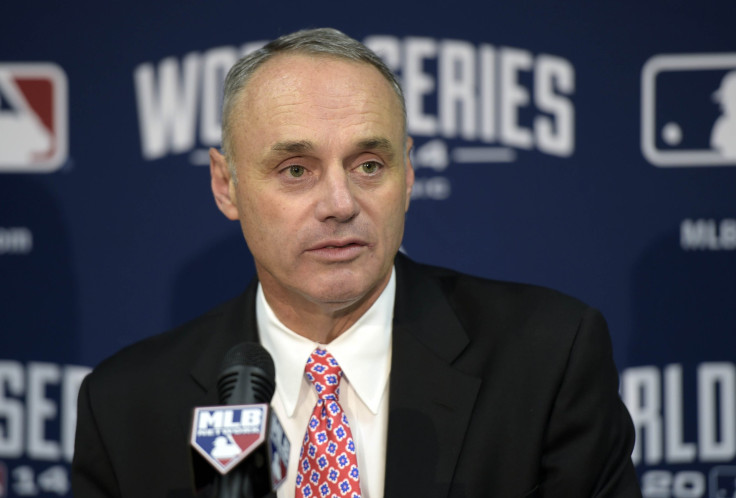MLB Commisioner Changes Gambling Stance: Federal System A 'Pretty Good Idea'

We now have two sports commissioners voicing support for a federal framework for sports gambling. At this weekend’s MIT Sloan Sports Analytics Conference in Boston, Major League Baseball Commissioner Rob Manfred gave some very qualified support for an idea that was once regarded as a third rail for professional sports leagues.
“I give Adam Silver a lot of credit for starting the debate,” Manfred said, according to Bloomberg. “Without embracing everything he said, certainly the idea of having a federal system to govern gambling -- whatever that system is -- uniformity at a federal level seems like a pretty good idea to me.”
Manfred’s remarks place him in the company of National Basketball Association Commissioner Adam Silver, who surprised sports fans across the country in November when he published an op-ed in the New York Times entitled “Legalize and Regulate Sports Betting,” which put him at odds with a stance that sports commissioners held for most of the 20th century.
The other top commissioners in North American sports, including National Hockey League Commissioner Gary Bettman and National Football League Commissioner Roger Goodell, remain opposed to legalizing gambling. Yet Silver has been making moves to rally support for his position among his fellow commissioners, convening meetings with all four commissioners, as well as the leagues’ respective legal teams, according to ESPN.
Manfred’s comments are significant because they imply that the current federal standard, which has been in place for more than 20 years, might be ripe for changing. In 1992, the federal government passed the Professional and Amateur Sports Protection Act -- also known as PASPA -- which effectively banned sports gambling everywhere except Nevada, where the practice was already legal.
Since its passage, a handful of states including New Jersey and Delaware have attempted to wriggle out of PASPA’s strictures. Those attempts have met with stiff resistance from the major sports leagues’ legal departments. Most recently, all four leagues, plus representatives of the NCAA, called for (and were granted) a summary judgment against New Jersey Governor Chris Christie’s attempt to repeal PASPA. New Jersey’s lawyers have filed an appeal.
Aggressively defending the current state of affairs while exploring a federal alternative to PASPA makes sense for the league’s commissioners and owners. “The leagues are always pushing for uniformity across the states,” explained Gabe Feldman, the director of the sports law program at Tulane University Law School. “Uniformity is key for professional sports leagues. Given the key of competitive balance across franchises, the leagues have tried to be as careful as possible.”
Manfred and the owners he serves will have a lot to consider. As the league that has the legacies of the Black Sox scandal as well as Pete Rose to contend with, it will need to carefully consider, then craft a comprehensive case for changing its attitude toward gambling on sports. “It's difficult for one league to hold a stance for a century and then wake up one day and change it,” Feldman said. “For Major League Baseball, gambling on professional sports is the cardinal sin. I think both from a legal perspective but also from a general perspective, it's not a change that will be taken lightly.”
Fantasy sports further complicate the state of play. At present, all four leagues either run their own fantasy sports operations or have entered official partnerships with fantasy sports providers. This past fall, the NHL entered an exclusive partnership with DraftKings, while the NBA signed a four-year endorsement deal with FanDuel.
Unlike traditional fantasy games, which essentially lock players’ rosters for all or most the duration of the real sport’s regular season (though players are typically permitted to make trades), daily fantasy allows participants to wager on teams they construct every single day. While neither FanDuel nor DraftKings permits wagering on the outcomes of the games, its users are wagering on players’ performances, which presents a similar moral quandary.
“It's really now become gambling,” Ron Katz, chairman of the Institute of Sports Law and Ethics at Santa Clara University in California, said of daily fantasy. “I'm sure some will argue it's not gambling, but I think there is an argument to be made that it is.”
While Manfred’s comments may represent a step, it is a small one. “I think this will be a methodical, laborious change,” Feldman said.
“These moral issues are always difficult,” Katz said. “If you don’t have integrity in a sport, you don’t have a sport."
© Copyright IBTimes 2024. All rights reserved.





















